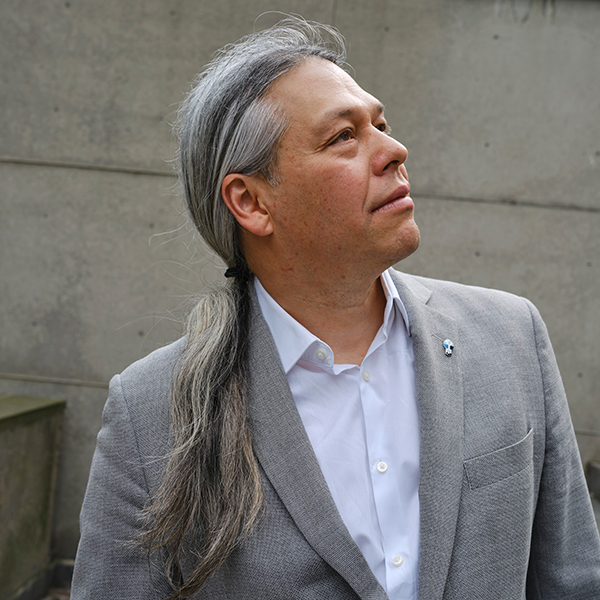Tell people that the world is going to hell in a handbasket and they’ll appreciate your candour, says Steven Pinker, BA’76, DSc’99. They’ll applaud you for your willingness to point to hard truths.
Tell them that things aren’t quite as bad as they might think, however, and they’ll look at you funny. Don’t you follow the news? Don’t you see all the headlines about war and corruption and poverty?
Pinker is here to tell you that things aren’t quite as bad as you might think. In fact, there is a lot of evidence to suggest that things are getting better – a lot better – in all kinds of ways. He has dozens of statistical charts to back that up and he’ll happily share them with you.
Pinker offers up a caveat, though. Most of the progress pointed to on those charts are a product of the Enlightenment and its central values – reason, science and humanism. If we ever turn our backs on those values, well, even Pinker might give in to pessimism.
“The Enlightenment has worked – perhaps the greatest story seldom told,” he writes in his latest book Enlightenment Now (which is where you’ll find all those helpful charts).
Pinker is a Harvard psychology professor, a best-selling author and a two-time Pulitzer Prize finalist. He says there are very good reasons why we tend to believe that the world is in a sorry state and that there are very real dangers associated with thinking that way.
Good news is usually boring, Pinker admits. It generally lacks the kind of drama that might make you pick up a newspaper or click on a tweeted link. And it’s rarely in sync with the quick churn of news cycles – progress tends to happen bit by bit over a long period of time.
Wars receive media coverage. The fact that the number of annual battle deaths has plummeted around the world since 1950 is ignored. Car crashes make the news. The fact that car-related pedestrian deaths in the U.S. have plunged since 1935 does not. Instances of famine attract the news cameras. The fact that the annual number of famine deaths has decreased dramatically in the last 100 years doesn’t.
“I think in the culture of journalism, there is a fear of complacency,” says Pinker, who visited McGill recently to talk about his new book before a packed amphitheatre at an event organized by the McGill Institute for the Study of Canada. “They see their role as safeguarding against complacency – so that people [can become] aware of the pain and injustice and suffering in the world – and that’s absolutely admirable.”
But that focus on the negative has its own negative side-effects. We believe that things are getting worse, says Pinker, because the bad news is what comes to mind most readily since we hear about it constantly. And there are dangers associated with believing that the world is on a downward spiral.
One of them, he says, is fatalism. “Why should I bother trying to make things better if all problems are intractable?”
The other risk, says Pinker, is radicalism. “If you think that institutions are failing so badly that they’re beyond reform, beyond improvement, you’ll be open to calls to burn the empire to the ground in the hope that anything that rises out of the ashes is bound to be better than what we have now.” Demagogues thrive in such environments, he says.
What would Pinker say if he found himself in a room full of senior editors from CNN, the BBC, the New York Times and other news organizations?
“I think reporters and columnists should be encouraged to put things into statistical and historical context,” says Pinker. “We need to report on gradual developments – an explosion can do a lot of damage in a hurry, but a building isn’t built in a day. A lot of the things [that] change our world happen a few percentage points at a time, [but they] accumulate to massive changes, such as the decline in extreme poverty worldwide. Those stories deserve coverage as well.”
Pinker would also encourage editors to “follow up on some of the crises of yesterday, to let people know how they were dealt with. If you are reporting on a disaster or a calamity when it occurs and you leave it at that, it gets fixed [in] people’s memories. In the eighties, there was a huge amount of coverage about the homeless. Very few people realize that, in the U.S. at least, the rate of homelessness has been slashed [since the eighties] because of the success of shelters and other programs.
“Another example is teen pregnancy. It was a bit of a crise du jour a number of decades ago. [Since then] there has been a huge reduction in teen pregnancy. That should be news – not just because it’s a significant development, but because it helps correct impressions that were left by the [previous coverage].”
As Pinker began researching the book, he found himself frequently surprised.
“I was not aware of the huge gains in safety; we’re 90 per cent less likely to drown and 92 per cent less likely to be burned to death. I was not aware of the huge increase in literacy worldwide – 90 per cent of the people in the world under the age of 25 are now literate. I would not have guessed that democracy has increased, that we had more democracy in the world at the end of Obama’s presidency than at the beginning. I was surprised at the decline of so many diseases. Malaria is in decline, pneumonia is in decline, [diarrheal diseases] are in decline. These are diseases that used to kill a lot of people in the developing world, especially children.”
For all of Pinker’s talk of progress, there are looming dark clouds that trouble him. The increase in political tribalism is particularly worrisome. It makes it more difficult to tackle other serious challenges, like climate change.
When discussing the resistance to taking action on climate change and its causes, Pinker says, “many people, including most scientists, think that the problem is one of scientific illiteracy; that if only we made people more aware of the science, they would come around.
“There are studies that show that the people who deny climate change are no less scientifically literate than the people who endorse it,” says Pinker. Individuals don’t tend to assess information in an indifferent way, but rather through the lens of their ideological beliefs.
Pinker asserts that this isn’t just an issue for the political right. The left also has its blind spots, in his view. Putting up roadblocks to genetic agricultural approaches that could benefit the developing world, for instance.
“People need to be aware of that syndrome of falling into tribes, demonizing the enemy, and being confident that their side has all the solutions,” says Pinker. “Social and political problems are extraordinarily complex. Any answer is going to involve tradeoffs. We have to be open-minded, we have to allow hypotheses to be tested, and we have to let the data persuade us about which options are the most effective.”


